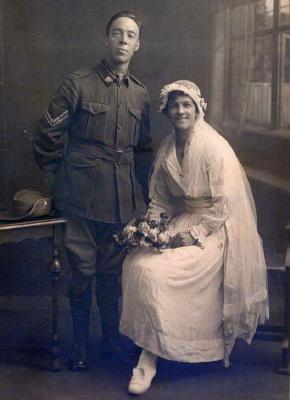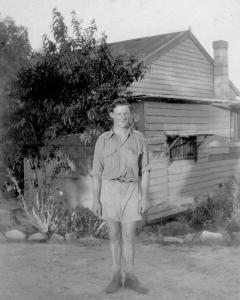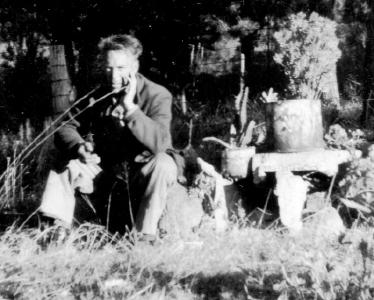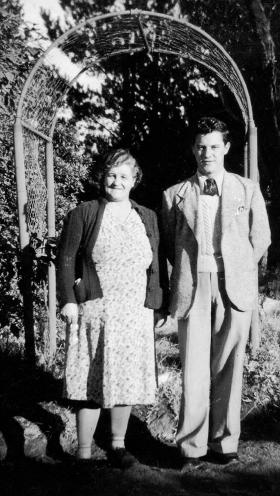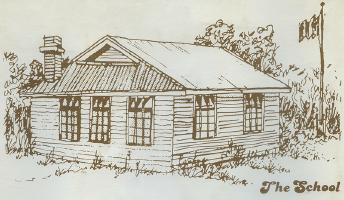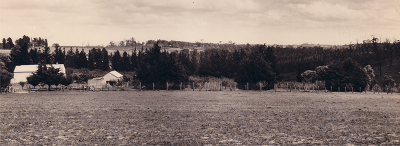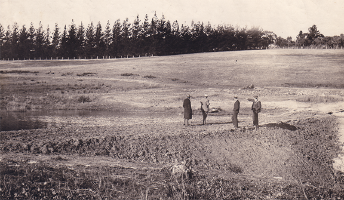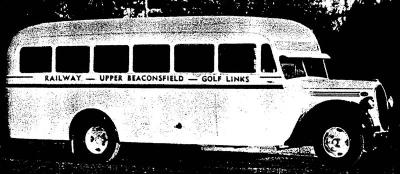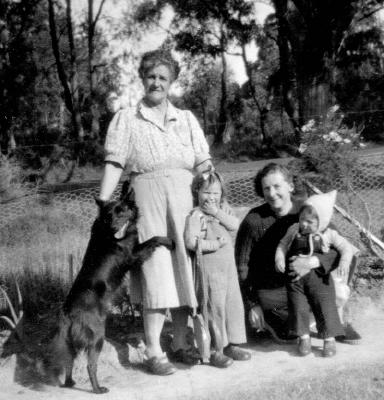Memories of Ernest William (Ted) HORRIGAN (1930-1999)
I was born Edward William Horrigan on the 27th January 1930. I was the youngest of 4, being the only one born in a hospital (Berwick).
I had 2 brothers and 1 sister, all of whom were born at home (McArthur’s Road, Upper Beaconsfield) with the help of a neighbour (Mrs Maggie Bennett), then the District nurse called a few days later to see if all was ok. She came up from Berwick on horse-back and my Mother says she stayed the night as the ride was long.
My Mother was Mabel Warrington, one of 8 brothers and sisters. She was born in 1898 in Nottingham, England, where my father met her during the 1914-1918 war. My father, Ernest Henry Horrigan, was born in 1893 and went to war in 1914. He married my mother in 1919 and they came to Australia. My mother was the first World War I bride to land in Australia.
My father said that he was an orphan, but that he was brought up on a farm in South Melbourne. The story goes as well as I can remember that my father and his twin sister (Dorothy) were found in a basket on a doorstep, so you can see that I know very little about my father’s history. He never talked about his boy-hood days.
In about 1925 our family shifted to the old school-site on Stoney Creek Road. The house, which they named Warrington consisted of a single room, which was built from galvanised iron and bush timber. My Dad and brothers set about building on. My first memory is a veranda built on one side and across the back. The original gal iron and the outside walls were covered with bark. My Mum and Dad, my sister Alma and I slept on the covered veranda and my two brothers slept outside in a half shed, half tent. The loo was quite a walk from the house and was built on to the chook house, saving a lot of building material (bark and hessian bags) over bush poles.
We never had electric light, in fact the S.E.C. didn’t get to Upper Beaconsfield until about 1937 and as we lived a couple of miles from the township it never ever did pass our place, but even if it had, us, like all the others couldn’t afford to get it on. The only ones to get it were the hotel, general store, a couple of guest houses and a few wealthies.
We were one of the few families who had a wireless in the 30s. Dad used to bring in the T-Ford battery of a night so we could have an hour or so of the radio. You had to have a wireless licence in those days. The cost was so great 5 shillings (50 cents) that we had to pull the aerial down and hide the wireless till all was clear again. Every house was contacted because not many had a wireless licence. Same as when TV came out in 1956 a licence costing £5 ($10) was necessary from the post office.
We had a kerosene lamp in the kitchen and a kero lamp in the lounge. We had a candle to go to bed with. We had a gallon of kerosene a fortnight and if it ran out before the two weeks was up, we used a candle in the kitchen and then everybody went to bed early. We had an open fire in the kitchen, which my mother used to cook on. I can remember when my father came up the drive in our “T-Model Ford” with a second-hand stove on the back. When the stove (Planet) was set in the open fire place with some bricks we all sat in the kitchen that evening just looking at our beaut stove. At this time I would have been about 6 or 7, because I can remember telling the kids at school we had a stove in the kitchen. The water was carried in from the outside and the washing up was done in a dish on the table.
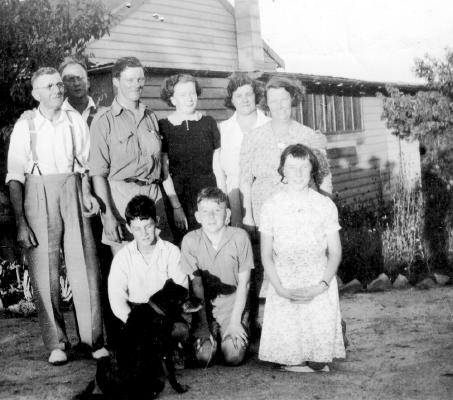
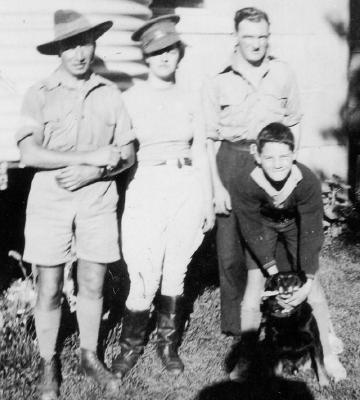
It was about this time 1936-37 that the man (probably Charles Ford) who bought about 200 acres of bushland had a golf course well in progress. He must have had a few quid in the first place because he had a couple of blokes working with him. I can remember them working with him. I can remember them working night and day to get it open (9 holes). My Father said he had borrowed money from the Colonial Mutual Insurance Co and had to have it open by a certain date.
However, he didn’t make it, and I remember him coming into our house. I had never seen a big man cry before. My Mum and Dad talked to him for hours with several cups of tea. Eventually he left with only what he could fit in his old car, which I think was a 1926 Dodge 4 Tourer. I have never forgotten that man crying. Believe me or not, but from that time on I have hated insurance companies and they would not even get a fart out of me.
The baker came up once a week from Beaconsfield and delivered bread. We had a big box on a tree down at our gate and Mum used to leave a note and the money for bread. We usually got 2 large loaves which today would be the equivalent of about 4 loaves of today. This had to last a week, it was too far to go and get it. My Mum used to make damper if we ran out. The baker came on a Friday. Just occasionally my Mum would be a couple of pence short but the baker still left the right amount of bread.
The butcher came up from Berwick on a Thursday and did the rounds of Upper Beacy. We used to get tripe, sausages, mincemeat and usually a leg of mutton. She would cut it and we would have boiled mutton on a couple of nights and once a week we would have roast mutton. The rest of the time we would have rabbit (boiled, baked, roasted, fried).
The fruit and vegetable truck came up also, but on a Saturday afternoon. If we ran out of home grown potatoes, my Mum would buy some at 1 penny a pound, my Father used to say don’t spend all the money on potatoes as ours will be ready soon. Apples were grown in the district so we always had a big supply cheap. The man on the vegetable truck was George Thomson and I always went down to the gate with my Mother. After my Mum got her goods, Mr Thomson always gave me a banana. It was usually over ripe. I suppose that’s why I like them like that today.
The mailman put our mail and the daily paper in our box. We got 6 daily Suns each week. This paper had to supply the kitchen stove lighting, sometimes 2 or 3 times a day, the open fire in the lounge, the copper for washing and for a bath once a week. But more importantly the paper had to supply the dunny. My father used to cut it into squares, make a nail hole through a leaf and put it on string. Often there wasn’t enough newspaper to lay the fire, so we used gum leaves.
The more wealthy people used phone-books in the loo as the paper was much thinner and therefore much softer on your bum. I suppose the real wealthies had toilet paper, but I can honestly say I had never seen it or even heard of it.
Things were really hard in those days. My father was a returned soldier after 4 years overseas. He had been severely gassed and he used to sit up most of the night. There was no medical attention and he received a pension of 14/- ($1.40) a fortnight.
My Father died in 1953 at 59 years old of a heart attack and my mother died at 79 of cancer of the pancreas. Both my Mother and Father are buried in the Berwick Cemetery.
I can remember my first push bike. My brother Dig scrounged lots of pieces from people also from the tip. I was about 7 or 8 at the time. The tyres had one over the other, no tube, just stuffed with rags.
I can remember my Mother used to do 2 days a week washing and cleaning. One day at Judge Bevan’s (Pen Bryn) and one day at Walkers (Fassifern). My mother used to get 6 shillings a day (60 cents). As a boy I remember tea was late on those nights.
School
I can remember my first day at school. I suppose I must have been 5 years old. Ernie took me and I remember I wouldn’t sit the other side of the school room with the babies, so the teacher let me sit with Dig. I can’t say for how long. The Upper Beaconsfield School was a single room, with about 25 to 35 kids. There were 8 grades and just one teacher. I went to school to the 8th grade. I never went to high school as most kids didn’t.
I was one of the lucky kids going to school. I always had a cut lunch (bread sometimes a week old) and my Mum used to do cooking every Saturday afternoon, so I always had a cake with my sandwich. My Mum was a good cook; we always seemed to have plenty to eat. She could make something out of nothing and not even a crust of bread was wasted. I know I am pushing this point, but not many kids did get enough to eat.
It was about 1940 when the Richardson family shifted from Berwick to the golf links in Upper Beaconsfield. It happened because Ted Richardson (my future wife Shirley’s father) worked at the golf links and at this stage, had probably worked there for a couple of years. Most people in Upper Beac knew Ted Richardson, because previously to working at the golf links he was our butcher.
The manager of the golf links (Herb Falconer) had a very sick wife, so Shirley’s mother kept house for them, as well as started a catering business (lunches etc) for the golfers. Dig worked at the golf links also my father worked there part time, milking their cow, etc.
Being a country boy I did the right thing and introduced myself to the girl. As we were the nearest neighbour to them (1 ½ miles) I volunteered to take Shirley to our school which I did. She used to call at our place before and after school. She used to hold my hand. My Mother used to say don’t let Shirley Richardson kiss you or you’ll die. One day while we were going to school, she got me behind a tree and kissed me. I said now you’ve done it. I’m going to die. She said how do you know? I said I can feel myself going stiff already. Our two families got on so well.
Start of World War II
It was 1939 and all our family were sitting in the front room (lounge). It was a Sunday night and we were listening to the Lux Radio Theatre 8 o’clock till 9. (Lux were soap makers of lifebuoy soap etc.) Sometime during that hour was when “WAR” was announced. I remember my father saying it was a pity, but at least now everybody would either join the army or have a job and get enough to eat.
When Ernie (Dig) was 14 he had to get a job (everybody did). I don’t remember how, but he got a job at a timber yard in Dandenong. The yard was G. N. Raymond. Ernie rode a push bike home on a Sunday from Dandenong and back the same day as in those days it was a six day week, and in Dandenong he batched in a shed at the timber yard. I can remember he was excited about leaving home (Con and Ernie slept in a tent.)
Con didn’t get much schooling as about 10 years old he got rheumatic fever. It left him extremely weakened, and I don’t think he got any school after that. I remember him at about 14-15 he used to trap rabbits and sell them door to door. He used to clean and skin them himself. A truck used to call and pick up the skins and he got 6 pence (5 cents) a pair for the rabbits. So that’s why I would never eat rabbit today.
When Alma turned 14 she left school also and went into domestic help. She got a live in job at Mr and Mrs Gardiners in Berwick. She did the cooking, washing etc. In fact all the household chores as they were fairly wealthy, at the same time, elderly. They said she got well paid, 15 shillings ($1.50) a week plus her keep. She got two afternoons a week off. She used to ride home on her push bike and my Dad would take her back (many tears) after tea.
The reason I don’t follow any sport today is because we never played any. Most kids never had the energy. Most kids were thin and puny, and often kids had to be taken home from school as they were just too sick. I don’t think anybody went to the doctor in those days unless there was a good chance of dying.
It used to cost 10/6 = 10 shillings and 6 pence ($1.05) but remembering that was almost a week’s wages for some.
I remember the O’Keefe family. There were five kids and I remember two of them dying of TB. One boy 12, and his sister about 8. They eventually left Upper Beac, so I don’t know what happened to the rest of the family. I know several families like this, but I won’t go into it.
Upper Beaconsfield Golf Course
Even though I had a hate of the “Colonial Mutual Insurance Co.”, as mentioned before, they did provide employment for a few blokes. They got "Snell Bros" in as contractors to form a lake, a road and finish the golf course (18 holes). They set up about 6 tents on Stoney Creek, which was just below our property. We had five acres and the creek ran on two sides of it. The contractor had a team of six big draft horses. They formed about 1 ½ mile of road and scooped out a big dam. All this work was done with horses. I think from memory there were six men in the contractors team and my Mum used to provide their tea at night after work.
I said at night, because we had tea about 6 and by the time the men fixed their horses, washed up in the creek and got up to our place it was often after 8 o’clock. My Mum always cooked a big meal and there was always steam pudding, jam rollie pollie, spotted dick or if she wasn’t well, maybe stewed plums and custard. My Dad, Con and a boarder we’d always had (Ted Clinch) all worked at the golf links. When Ernie left his job in Dandenong and also worked at the golf links.
So as you can see my Mum looked after the six of us at home (she always laid my clean clothes out) as well as cooking for the other six men which lasted for about six months until they finished the golf links. Both Ernie and Con bought motorbikes about this time. Con left the golf links and got a job driving a truck in Melbourne. He boarded with Auntie Dot, but didn’t last long in Melbourne. He joined the army when he turned 18. (The official age to get a licence was 17 but Ernie, Con and I got it at 16 or a month or two over. Ernie stayed at the golf links, but he also joined the army about the same time as Con (about 1941-1942). It was about late 1942 when my Father said, I’d better join up in this war and show these young blokes how it’s done.
My mother said they wouldn’t take old sick blokes, but they did. My father would have been about 45. My Dad was posted in the army on guard duty. The aerodrome at Essendon, then the wharf at Port Melbourne and then he finished the war out guarding the power station at Yallourn.
Alma eventually got a better job in Melbourne. So from 1942 till 1945 there was only my Mum and me at home.
Home life during the war years
I forgot to say with all the work going on my Mum and Dad updated our “T-Model Ford” (which we kept for getting firewood) to a “1927 Buick” Sedan. So before my Dad went into the army, he took my Mum down to the Berwick police station and Constable Bryant felt so sorry for my Mum that he gave her a driving licence. The Buick cost a lot of money then £40 or ($80). The “T Ford cost £5 (or $10) in those days. I can remember petrol was 1/3 or 1 shilling and three pence (13 cents) a gallon, but you didn’t say fill her up, you bought usually 2 gallons at a time.
During the war you got coupons for 4 gallons of petrol per month and a 1 gallon coupon a month for a motorbike. We ran the vehicles on power kerosene, metho, in fact anything that would burn. You also had to have coupons for meat, butter, sugar, tea, clothes etc. The rationing coupons stayed until 1948-49.
Ernie was in the army about 12 months. He was a driver and while driving a truck, a tree which was being felled, fell onto the truck cabin. Dig was put into hospital with bad facial injuries, broken nose, etc., broken leg and an almost severed foot. He was discharged about 6 months later. He had a bad limp, which he had for the rest of his life. My father being in the army in Yallourn got Dig a job driving buses. Con was a dispatch rider (motorbike) and finally settled in WA when the war finished.
School Entertainment
I can always remember our school break ups at Xmas. School finished at lunch time and we would make our way up to the township. The school was a couple of kms out of town. We could all then go to the hall, where most of our Mothers would put on a great lunch for all the school kids (25-30). The trestles would be decorated with fancy paper etc. They also had table cloths on. I remember a lot of the kids had never seen table cloths before and thought they were only used at parties.
There used to be fresh bread with hundreds and thousands on. Little cakes with icing (different colours) and to top all this beaut party off, we also had raspberry cordial. We used to get a plate of jelly and a little bag of boiled lollies. Then we had games, more little cakes and everybody got a drink of cordial and then went home. A few of the kids were sick, they couldn’t take the rich food and drink.
Mum is taken ill
I was about 8 when my Mum had a stroke. Dad had to take her in our “T model Ford” to the Women’s Hospital in Melbourne. From Upper Beac to Melbourne was 40 miles, but having two punctures and boiling problems, it must have taken several hours. I remember Mum couldn’t even talk then. Dad and I got home late the next day after he reckoned Mum would be ok.
Ernie did the cooking and cleaning before and after school. We all went down to see Mum in the “T” at the weekend. The doctor said she would be there for at least a couple of weeks. So I remember us calling to see Auntie Nell at South Melbourne. She came back with us for a week or so. I remember Norma was about 3 and a bugger of a kid.
My Mum and I used to sit by lamp light of a night. We listened to the news on the wireless at 7 o’clock just for half an hour, as with no power and batteries being not only expensive, but due to the war very, very scarce.
Moving to Melbourne
I always said I wanted to be a mechanic. Mum used to say, there is nowhere up here for you, so when the war finishes we’ll see about boarding you in Melbourne.
I was just 14 and in the 8th grade and in the last year of school, when Nell wrote to us and said that there was a house, she knew the people and we could rent it. It was at No 2 Mountain Street South Melbourne. So all the arrangements were made for Mum and I to shift. We lived down on Stoney Creek then. Mr Colles who had apple orchards up the Stoney Creek Road and who my Dad had worked for, offered Mum the use of a shed to store all the stuff we weren’t taking to Melbourne. So for the next couple of weeks Mum and I made dozens of trips to store our stuff. Mum rented our house out to some friends of Burtons for 10 shillings ($1) a week. Mum said we can’t take the Buick to Melbourne, as there is too much traffic, so she sold it to George Thomson for $50.
Claud Harris came down in his cattle truck, loaded our furniture and I had to say goodbye to Mick our dog and Darkie our cat as she said we couldn’t have them in Melbourne. I sat in the back of the truck with the furniture and I think I cried all the way to Melbourne. Going to Melbourne was the hardest thing I ever had to do. Leaving the old house, cat, dog, and all the kids at school. This was my whole lifetime of 14 years and all I ever knew, but Mum convinced me this was the right thing to do.
With the war still on, you couldn’t just get a job anywhere, you had to go to the “Man Power” office. Mum and I went in and I had to take a job at ‘Radio Corporation’ in South Melbourne. They were building radio equipment for the Army etc. I worked in the transformer Dept, cleaning up parts. The hours were 8 am to 5 pm Monday to Friday and 8 to 12 Saturday morning. My pay for a 44 hour working week was £1-2-6 ($2.26).
I'm taken to hospital
After we had been living in South Melbourne about a month, my Mum cooked tripe and vegs one night. In the early hours of the next morning I had violent pains in the stomach. Mum put a hot poultice on my tummy. I can remember that it got terribly worse. And my poor Mum got terribly distressed with all my pain. She ran down the street to the phone box and rang a doctor. He came and said it is appendix and will have to be operated on. The doctor rang the ambulance and they took me to the Alfred Hospital where they operated on my appendix. I never got any better and I can remember the Army blokes bringing my Dad and Mum in to see me. I suppose the doctors thought I was going to die. Not eating for a couple of weeks and being examined by about six doctors, they decided to operate on me again. They found a pelvic abscess. So with some tubes in for draining, another week and I was on the mend. I was in the Alfred Hospital for about 6 weeks. I have never eaten tripe since, even though Mum cooked it once a week.
I was home for a few days, when Ernie came down from Yallourn. He took me back for a week or so to Yallourn where he paid for my stay in the Yallourn Guest House. I spent a lot of time with him on the buses. Ernie put me on the train for South Melbourne and home to my Mum. After an Alfred Hospital check-up I was eventually sent back to work at Radio Corporation. Shortly after, the war finished. My Dad came home. Con called to see us in Army uniform at South Melbourne, as he was then transferred back to Western Australia, where he got married a year or so earlier.
Now that the war had finished and the “man power” was finished also, I left Radio Corporation and got a job at “Cottmans Motor Bike Agency”. I thought I would be able to ride motor bikes etc. All I ever got to do was sweep the floor, wash parts and run messages. I lasted about 2 or 3 weeks. I then got a job at Motor Spares in Elizabeth Street. In the money now! £1-5-0 a week ($2.50 a week) and no Saturday. Once again, sweep the floor, get lunch orders, run messages. A grown up boy of 15 can do better than this, so I convinced Mum and Dad back to Upper Beaconsfield.
Return to Upper Beaconsfield
So once again Claud Harris brought his cattle truck to ferry us back to Upper Beacy and away from the electric light, gas stove and a pull chain toilet. Mum said it’s wonderful to get back to our Kero lights, wood stove and our old pan loo down at the chook house.
We got back to Upper Beacy about the Thursday or Friday and Dad said well, where will you start work on Monday? So onto my push bike and around the traps. Knaptons said I could start there at 7 am Monday. I asked about wages and Frank Knapton said, if you can do a man’s job we’ll pay a man’s wage, which is 8 shillings (80 cents) a day. Whacko! So back to 6 days a week. They paid me the following Saturday after work 6 o’clock. I remember I got a cheque for £2-4 ($4.40) and he said he had to take out 4 shillings tax. Knaptons had big apple orchards, so I did ploughing with a horse team, sawing firewood, cleaning up and general rouse-a-bout.
I saved hard and eventually I had £40 ($80) saved up. I wrote to Len, my brother-in-law, and asked if he knew of a motorbike for sale as I had £40 saved up. A week or two later he rode up from Essendon (where Alma and Len lived) on a 500cc Royal Enfield. He said it was £50 and he would lend me the £10. So I went back with him and I rode it home from Essendon. I rode it to work and round about for a couple of months. Dad said as I was a couple of months past 16, and you could get your licence at 17, he would ring the local policeman (Charlie Bryant) at Berwick and book me in. A couple of days later I went for my licence. The policeman said I have seen you riding about so I paid my 5 shillings (50 cents) and now I had my motorbike licence.
My Dad said I suppose you want your car licence now, so once again down to Berwick police station. Constable Charlie Bryant did the honours and I paid my 5 shillings. I forgot to say our car was a “1929 Chandler”. It was an 8 cylinder sedan like the local hearse, but it got along pretty well.
About this time I got pneumonia and was pretty crook. Mum and Dad got some medicine from the Berwick Chemist, but I remember I was pretty sick, up half the night, coughing for a couple of weeks. Ernie Brown’s family used to call and see me, in fact most people called. When I was almost better, the Brown family took me to Mildura grape picking for a holiday. There weren’t many grapes to pick as I think they were finished, but it was a good holiday I remember.
When I got back from Mildura, Dad said that Herb Falconer (the manager of the golf links) had been in and had offered me a job. So I went up to see him and he offered me £2-10, for a 44-hour week (5 ½ days). So I started work at the Beacons Hills golf course. There was lots to do, cutting the greens, tees, fairways etc, as well as alterations, cutting wood, watering, etc.
After about 6 months Herb Falconer bought the Upper Beaconsfield bus service. He offered me the job of driving it. He gave me an extra 10 shillings ($1) a week. I had to leave the golf links at ¼ to 7 in the mornings Monday to Saturday. Take school kids and people to Beaconsfield station to catch the ¼ to 8 steam train to Melbourne.
I had to pick up the mail and papers for Upper Beacy. I got back to the golf links about 9.30, then work on the links for the rest of the day until about 4.30, get tidy, pick up the bus, get the mail bags from the post office and go to the Beaconsfield Station and pick up the passengers off the train which got in about 6 o’clock. After putting the bus away I went home for tea about 7 o’clock or so. I thought I was well paid for a 72 hour week and so did everyone else.
When I look back now, I worked there 18 months. I never got holiday pay, sick pay or any public holidays, because living in the bush you didn’t know, in fact no one knew, only the bosses. Thank God for Unions today. A bloke came to work at the golf links (Tony Bromage) and he said he had a mate working on the CRB at Yallourn. He said I’ll put it on him for a job for a couple of truck drivers. After a couple of weeks, his mate wrote and said come to Yallourn North and see the boss ready to start in 2 weeks’ time. You will be living in a CRB camp, shift work, 7 day roster, 3 shifts and the pay is £24 a fortnight and don’t forget to tell them you are 21. As there was a shortage of labour in those days I was able to drive a truck on one shift, I got to operate Tournapulls and Dozers on a couple of shifts on the other shifts. On pay days the money just rolled in.
The Horrigans sold their house on Stoney Creek in 1952 to John Blackpool Eastham for £1,400. Mabel bought Tet Holmes' property, which was nearer to the village, at the corner of Stoney Creek and Beaconsfield-Emerald Roads. Within a short time she subdivided it, and sold the greater part to Cuthbert Harris (Claud's son) for £400.
This house was also called Warrington. Mabel lived in Upper Beaconsfield until the early 1970s when she moved to Coburg where Alma and Len lived.
